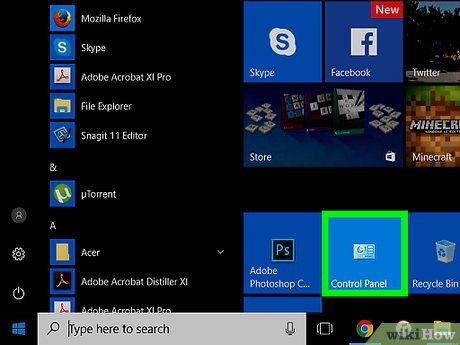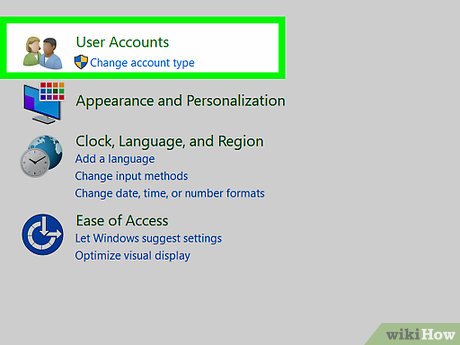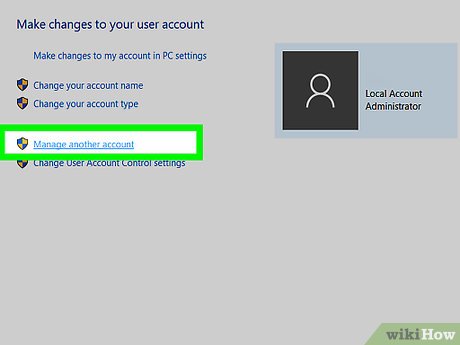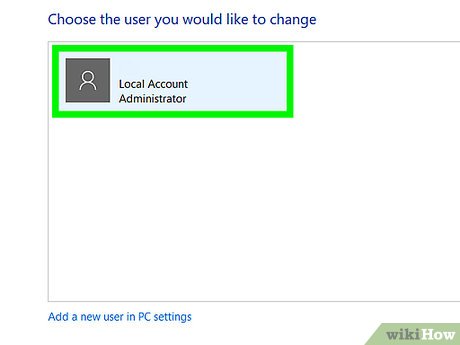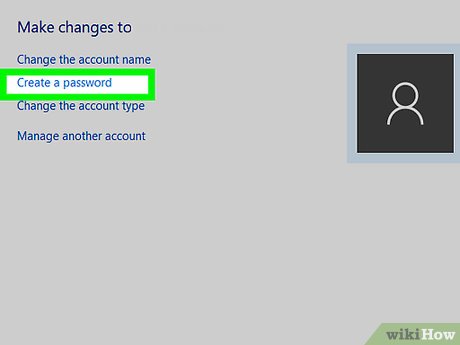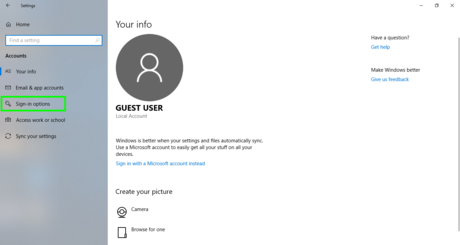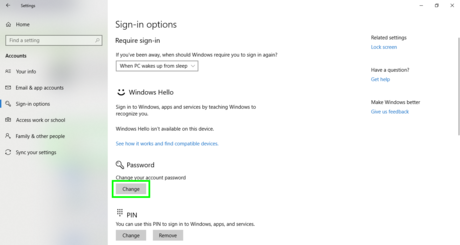How to Password Protect Your Windows Computer
Method 1 of 3:
Through the Control Panel
-
 Open the Control Panel.
Open the Control Panel. -
 Click "User Accounts".
Click "User Accounts". -
 Make a new user account or if the existing one is yours then skip this step.
Make a new user account or if the existing one is yours then skip this step. -
 Click on your account.
Click on your account. -
 Click on "Change Password".
Click on "Change Password". -
 Choose a strong password which cannot be guessed.
Choose a strong password which cannot be guessed.- Type a password hint (don't make it your password), which will come up if you enter the wrong password when you log in. The password hint might jog your memory if you forgot your password.
-
 Enter the password again to confirm it.
Enter the password again to confirm it. -
 Click on Create password.
Click on Create password.
Method 2 of 3:
Through the Settings App
-
 Open the Settings App.
Open the Settings App.
-
 Open the "Accounts" page.
Open the "Accounts" page. -
 Click on the "Sign-in options" tab.
Click on the "Sign-in options" tab. -
 Under "Password", click on Change.
Under "Password", click on Change.- If your computer does not have a password, then the button will say "Add"
-
 Choose a strong password.
Choose a strong password.- If your computer already has a password on it, then you will have to enter that password into the "Old password" box.
- Confirm the password by typing it again.
- Type a password hint (don't make it your password), which will come up if you enter the wrong password when you log in. The password hint might jog your memory if you forgot your password.
-
 Click Next.
Click Next. -
 Select Finish. Your computer now has a password on it that will have to be entered whenever anybody tries to log in.
Select Finish. Your computer now has a password on it that will have to be entered whenever anybody tries to log in.
Method 3 of 3:
Using a BIOS Password
-
 Understand what a BIOS password is. A BIOS password is the extremely strong password that locks up the hardware and makes the computer completely unusable. There are two different kinds of BIOS passwords, a User password, and a Supervisor password, their differences are listed below:
Understand what a BIOS password is. A BIOS password is the extremely strong password that locks up the hardware and makes the computer completely unusable. There are two different kinds of BIOS passwords, a User password, and a Supervisor password, their differences are listed below:- Supervisor password: This is a password that only locks the BIOS configuration menu. You might want to at least set this password and make sure that your hard drive is the first boot device since it will prevent someone from removing your Windows password with a password reset disk.
- User password: This password locks down your whole computer. When you start up your computer the first thing that will come up will be a box asking you to enter this password. You have to enter this password before the computer will start.
-
 Open the BIOS. You have to press a button when you see the computer logo at startup to enter the BIOS. The button you press varies by computer manufactures, below are some of the more common ones:
Open the BIOS. You have to press a button when you see the computer logo at startup to enter the BIOS. The button you press varies by computer manufactures, below are some of the more common ones:- Dell: F2
- HP: F10
- Lenovo: F1
- Asus: Del
- If these buttons don't work, or if you have a different model, then you can try to search online for the correct way to access your BIOS.
-
 Navigate to the Security tab. The tabs will be show near the top and you will typically use the left and right arrow keys to change the tab selection.
Navigate to the Security tab. The tabs will be show near the top and you will typically use the left and right arrow keys to change the tab selection. -
 Decide what password you want to use. Review the differences between the two passwords above and decide which one you want to set, or if you want to set both of them.
Decide what password you want to use. Review the differences between the two passwords above and decide which one you want to set, or if you want to set both of them. -
 Enter the password that you want to set. Make sure that you remember this password as it can be difficult to reset it if you forget.
Enter the password that you want to set. Make sure that you remember this password as it can be difficult to reset it if you forget.- You might want to write the password down on a piece of paper, and then lock the paper in a safe so that if you ever do forget it, you can still get access to your computer.
-
 Head over the Exit tab. Once there, select the option that allows you to save your changes and exit or reset. Once you do that, the BIOS password will be set.
Head over the Exit tab. Once there, select the option that allows you to save your changes and exit or reset. Once you do that, the BIOS password will be set.
Share by
Isabella Humphrey
Update 04 March 2020
